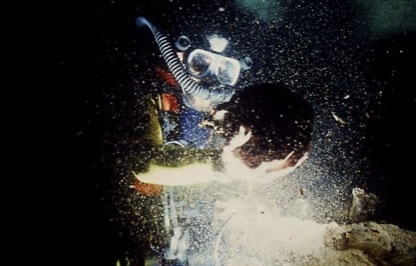
The first ever Lucayan canoe found in the Bahamas

The first ever Lucayan Indian ceremonial canoe was found on South Andros Island in a cave called "Stargate blue hole". In "Stargate blue hole" which is located in a township called the Bluff, on South Andros, a first ever canoe, what is thought to be a ceremonial, because of it's size, was found on a ledge in 20 metres of water under deep layers of old leaves and twig fragments. This was a unique find. No recent inhabitant of the islands had paddles dugout canoes shaped like this. This canoe was most likely 500 to possibly 1000 years old. The canoe which was less than 2 metres long was extremely fragile. In underwater wood classifications, wood is classified into five levels, numbered one to five in ascending order of fragility.
* One is fairly solid.
* Five means that the wood is so decayed that simply touching it would cause it to fall apart
in your hands.
What happens with wood over time is that the sugars bonding the fibers of the wood together are slowly dissolved over time, and, the longer the wood rests in the water, the more fragile it becomes. Eventually only fibers are left, and their fragility finally becomes such that the slightest movement will cause them to break apart and float away.

The canoe at this time is still in its final stages of preservation. Do to the unfortunate lack of support of the Bahamian government to issues concerning archeological finds and the protection of such finds, no money has been made available to help finish preserving the canoe. To this day, the canoe has not been properly dated, nor has any further attempt been made to possibly date the human remains of the canoe, which were examined and surveyed by Dr. Schwabe in August of 1997 during a filming expedition. Other archeological sites are always under threat by pot hunters, by both Bahamian and visitors to the islands.
Update June 2004
As of June 2004 the news on the state of the canoe was not good. Although personal viewing of the canoe was not possible at this time, the report was that the canoe was in worse shape than when it was discovered in the cave. It has been reported that in trying to put it together the canoe has splintered resulting in further damage.
Additional bad news; the bones which were discovered in the same cave with the canoe have been removed. These bones were discovered and documented in a film in 1997. The party that removed the bones claimed that they discovered these bones and have taken them out of the cave. The Rob Palmer Blue Holes Foundation would like to see these bones returned to the site where they were found. This disturbance of a sacred indian site is an example of the worst kind of archeological piracy. Many Lucayan bones have been collected and are stored in cardboard boxes in Nassau, surely this was not what the Lucayan's expected for their dead. The need to remove more bone from these special burial sites is truly not necessary.

Rob Palmer looking at his first discovery of the 500-1000 year old human remains of a Lucayan Indian in a fracture cave on South Andros, The Bahamas.
Lucayan Ceremonial still in situ where it was discovered in 1996